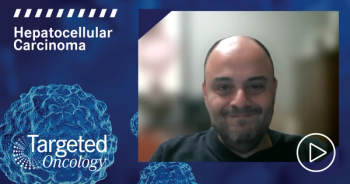
Case 1: Systemic Therapy in Combination With or Following TACE/TARE
A brief discussion on the role of systemic therapies in combination with or following TACE/TARE in unresectable hepatocellular carcinoma.
Episodes in this series

Transcript:
Ghassan K. Abou-Alfa, MD: We can’t give fair justice to TARE [transarterial radioembolization] without the expert on TARE, Dr Salem. Riad, 2 questions for you. No. 1, how do you time the TARE and TACE [transarterial chemoembolization] with systemic therapy? No. 2, how do you transition within that timing?
Riad Salem, MD, MBA: I’ll give you a combined answer, Ghassan. The reality is, at tumor board, once we’ve done proper staging and proper selection of what treatment we’re going to utilize, my job as an interventional radiologist is to make sure I maximize that benefit for that patient with that therapy without causing a degradation in the liver function. That means proper patient selection, frequent review at tumor board, detailed review of labs and adverse events, etc. My job is to make sure that the patient, along their life, throughout their movement through the algorithm of HCC [hepatocellular carcinoma] management, is able to benefit from all the therapies. One thing we’ve learned is, of course, you have to have good liver function for systemic therapy. All the trials are based on that.
Amit is absolutely right: What we need to do when we’re doing a TACE or a TARE is be as selective as possible and as careful as possible and select the right patient. If something happens in terms of degradation of liver function, we need to make sure we hold off. We don’t just formulaically do multiple treatments and sessions just because you’re supposed to do multiple sessions. Review them at tumor board with people like yourself, Mark Yarchoan, and Amit Singal, and then decide: should we proceed with the next session if everything is good? Or are we at a point where we think we’ve maximized the benefit and that we need to move on to the next option? In most cases, that’s a systemic therapy type of option. It’s my responsibility to make sure that the technique is done properly, that I teach and train the proper technique, and that the patient is able to flow in an organized, well-thought-out manner, to benefit from all the therapies available throughout their life.
Ghassan K. Abou-Alfa, MD: Thank you so much for that, Dr Salem. What we just heard is very critical. It’s best illustrated by all 4 of us sitting together with the difference expertise that we each put on the table. A multidisciplinary team approach, as Dr Yarchoan referred to at the beginning, is absolutely critical because you want to make sure that not a single patient is harmed in 1 specific therapy or an intervention or with a specific treatment. You want to make sure that we address with the expertise and the appropriateness of the care needed by the experts in different fields—ie, when it comes to TACE and TARE. As Dr Salem mentioned, it’s key that we make sure that the experts are the best at doing the treatment; it’s very important. It’s not a matter of choice or preference. It’s a matter of making sure we do it right and it in a discussion manner moving forward to the other needed therapies, like systemic therapy, for example.
Transcript edited for clarity.










































